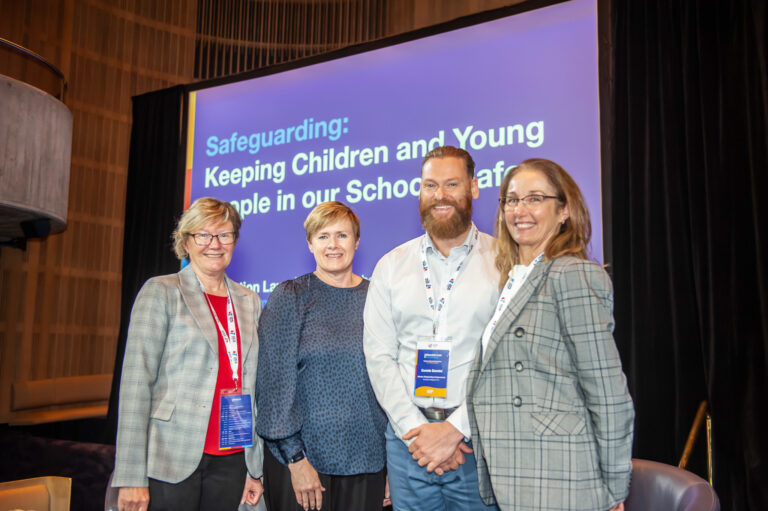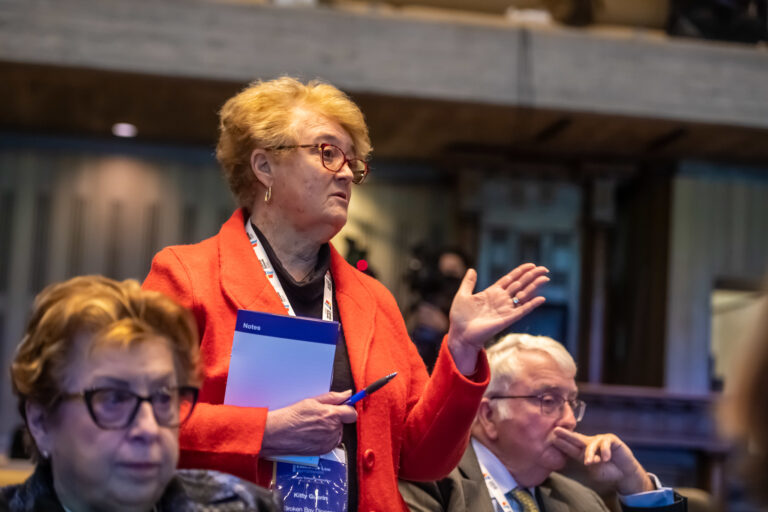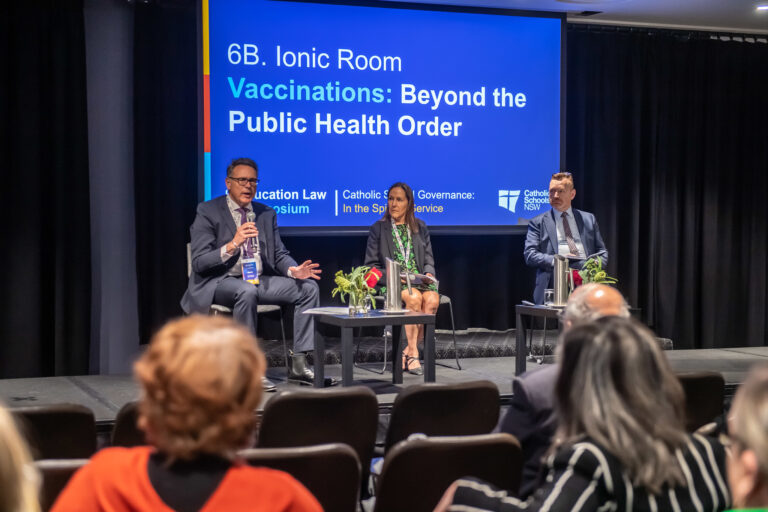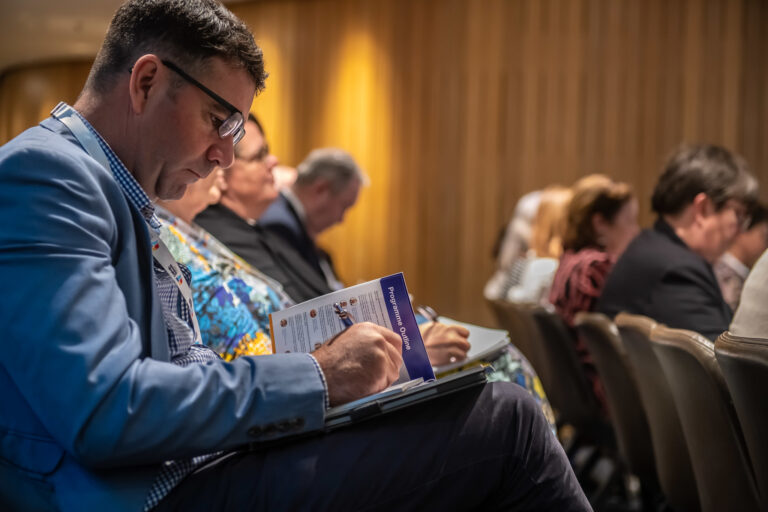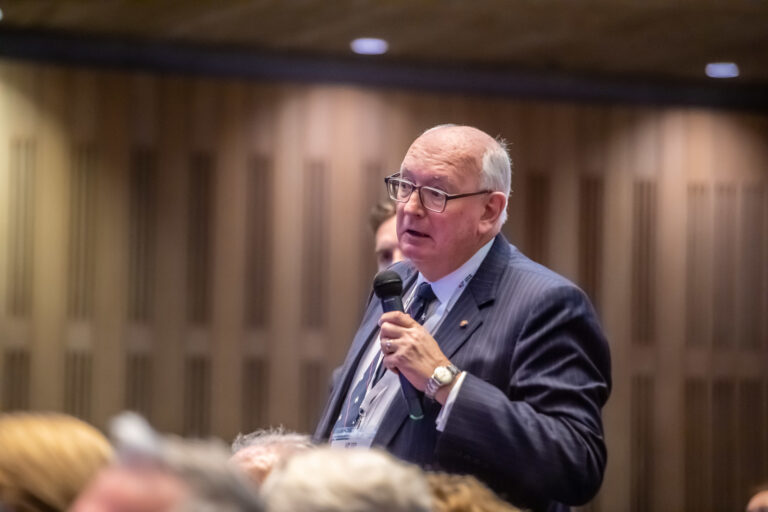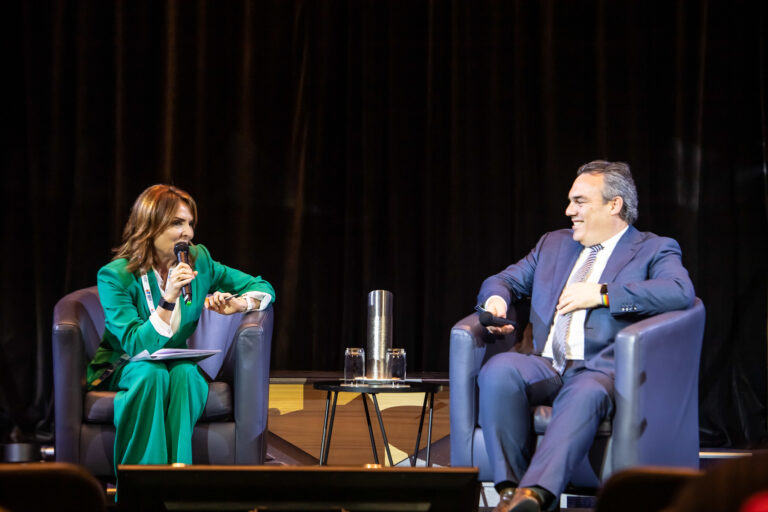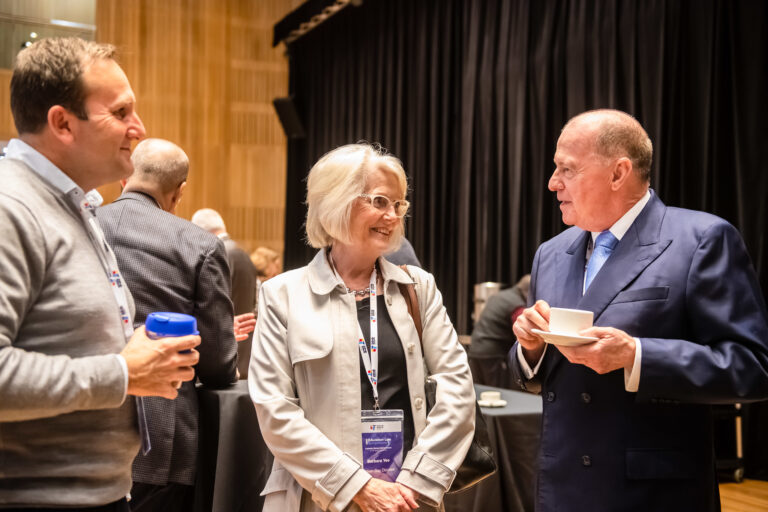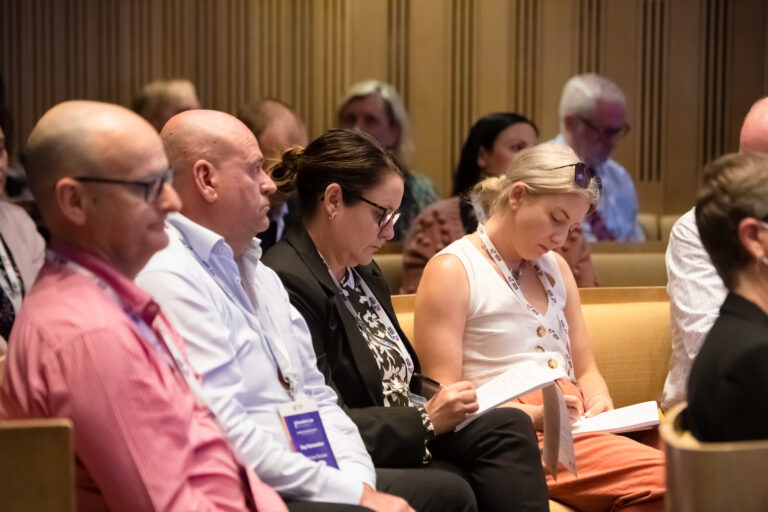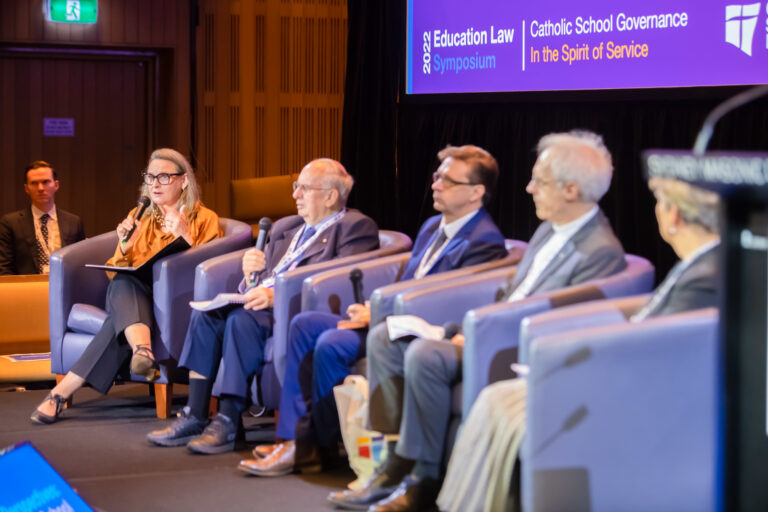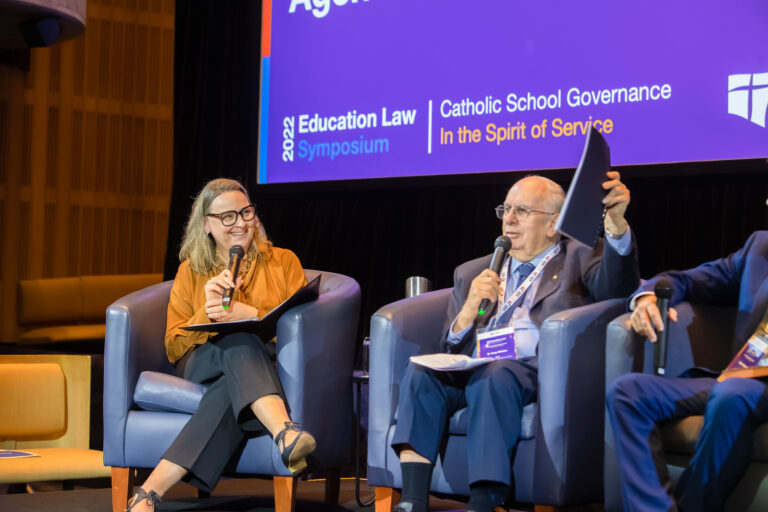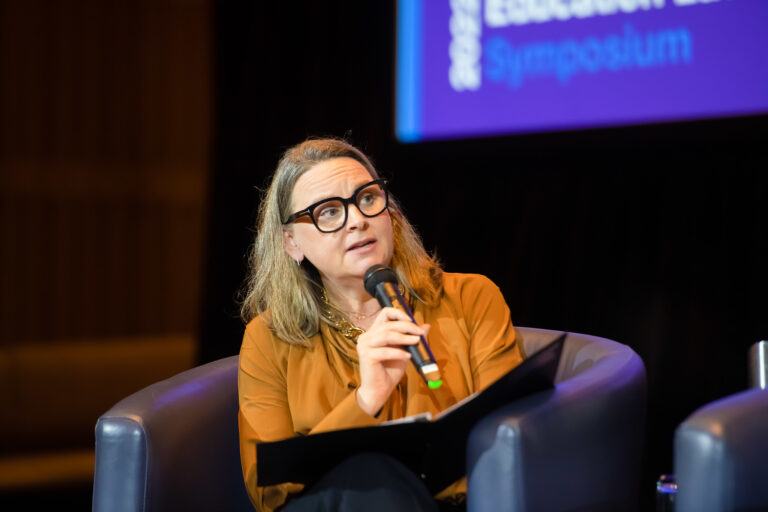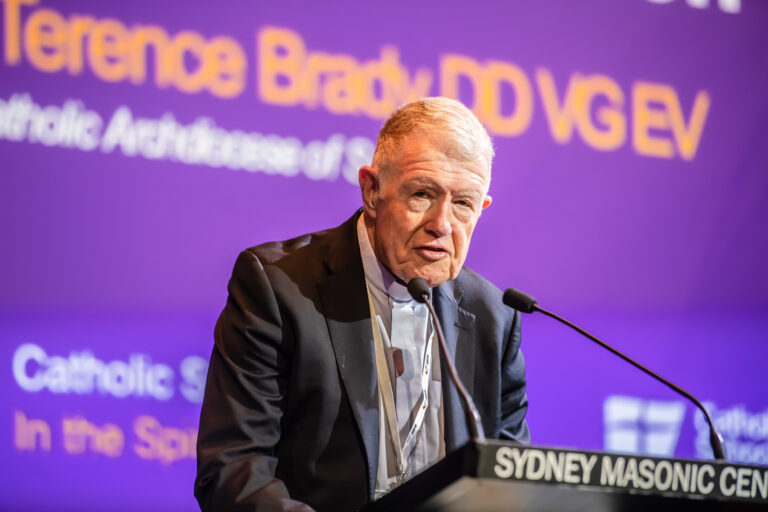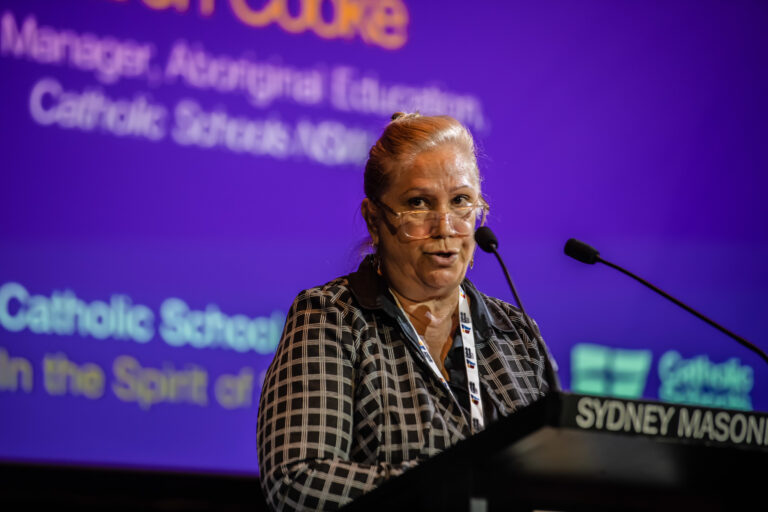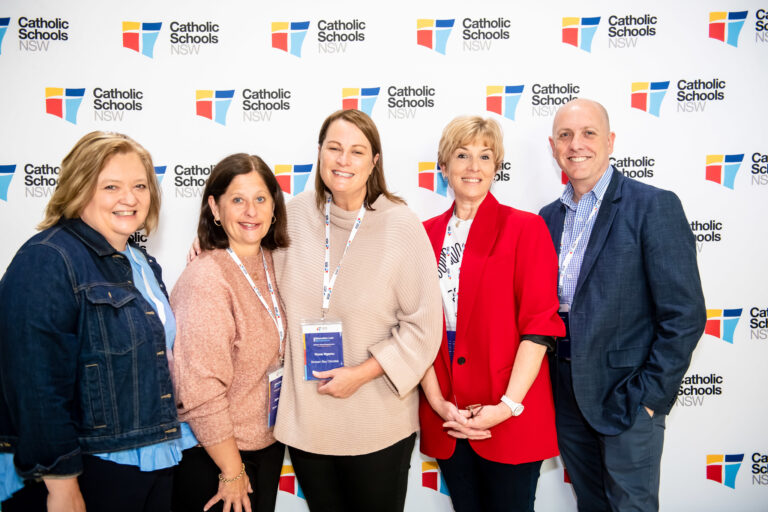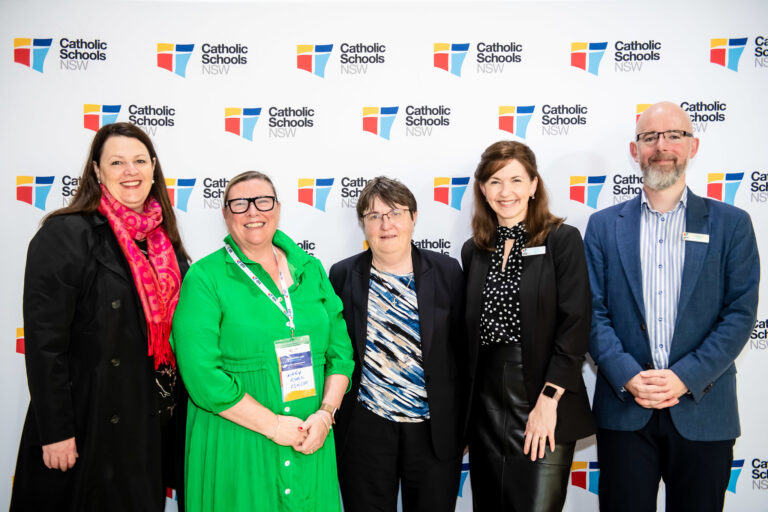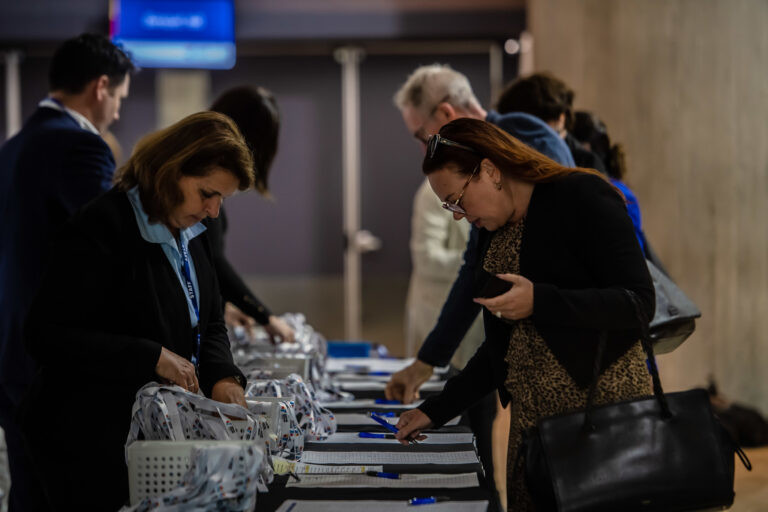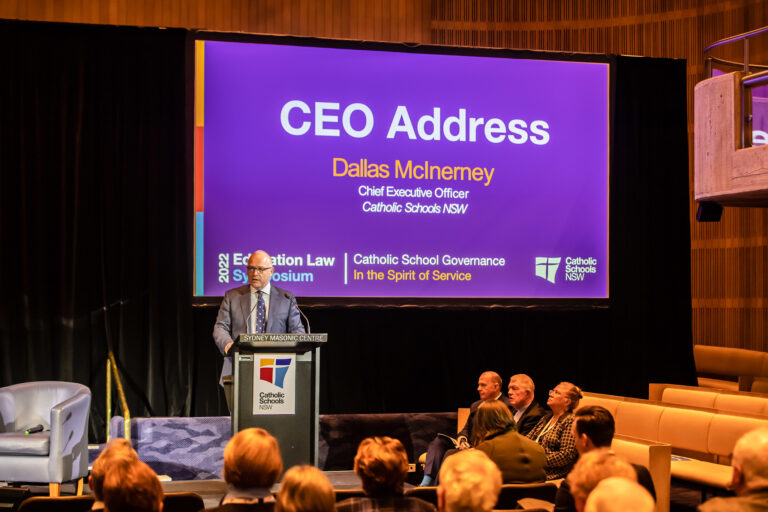Registrations Now Closed
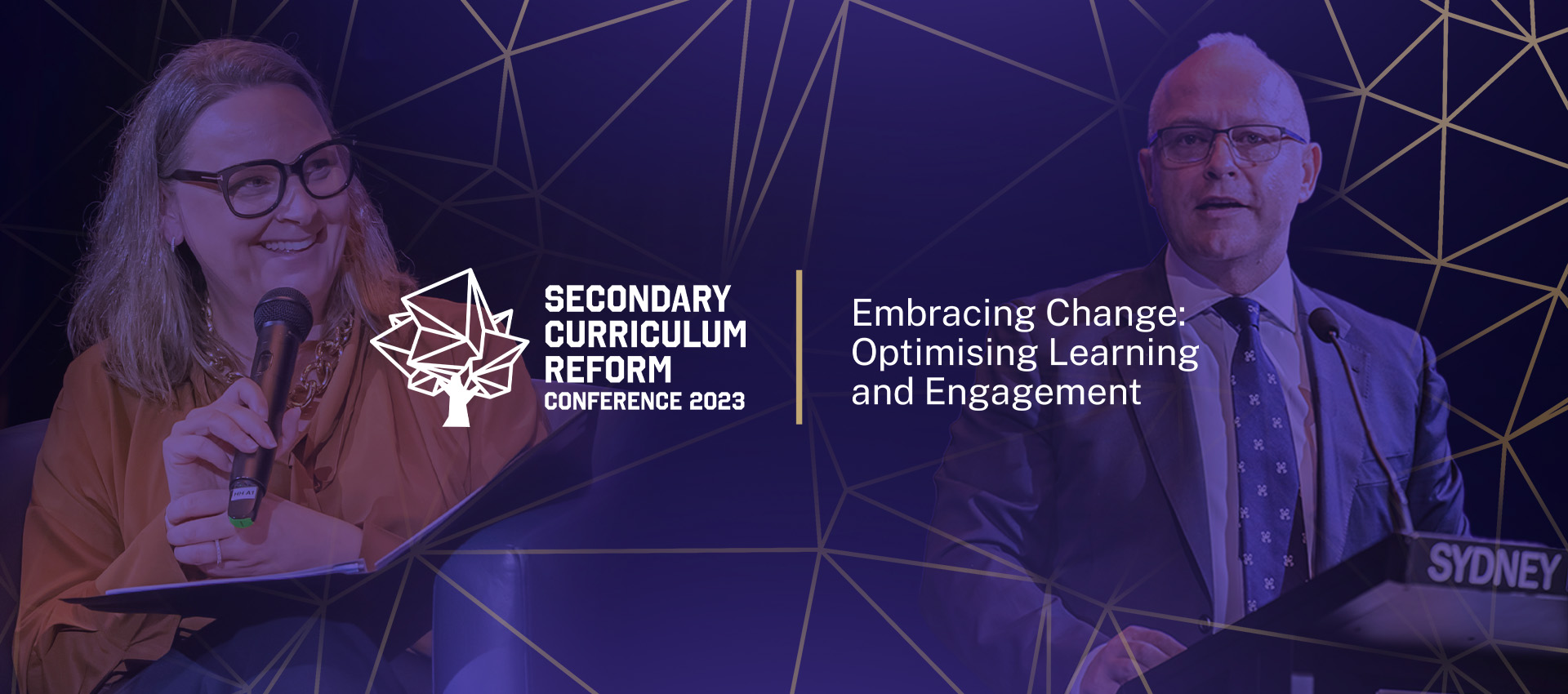
Registrations Now Closed
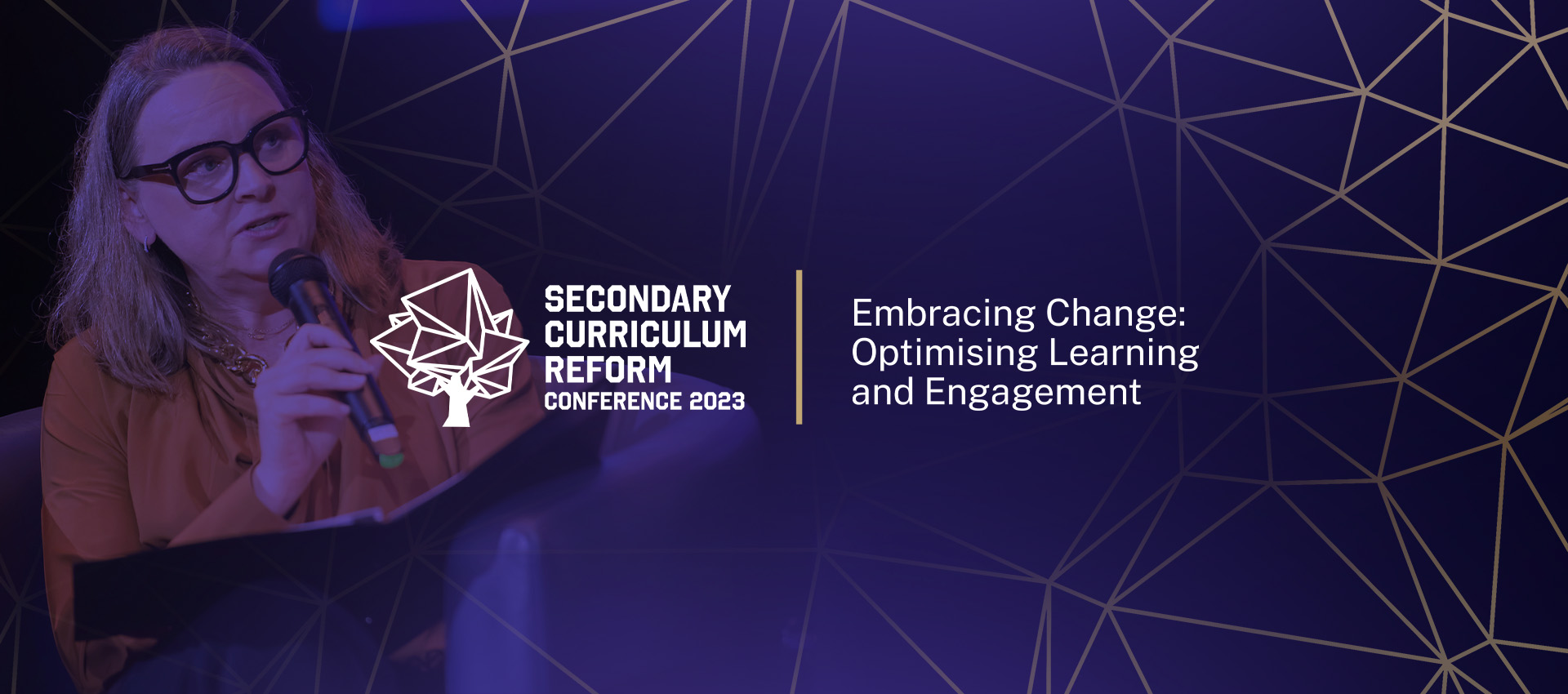
Join us for the 2023 Secondary Curriculum Reform Conference
Catholic Schools NSW invites teachers and leaders from across the state to the two-day Secondary Curriculum Reform Conference on Thursday 24 August to Friday 25 August 2023.
The last two years for teachers in NSW has been a time of reflection and consultation on the future directions of the curriculum. The NSW Curriculum Reform aims to ensure that our young people are well-prepared to make a contribution to our society and to the world. The reformed NSW syllabuses are the roadmap to this future. Now is the time to seize this once in generation opportunity to optimise learning and engagement enhancing our practice across the secondary curriculum.
The conference will consider this exciting opportunity and responsibility to make lasting change through the lenses of:
- the syllabuses
- the cross-syllabus drive to improve reading, writing and communication
- assessment
- ensuring we meet the learning needs of the most disadvantaged
- leadership and change management
Please join Catholic teachers and leaders from across the State to consider this exciting opportunity and responsibility to make lasting change.
Date
Thursday, 24 – Friday, 25 August
This year's venue
InterContinental Sydney 117 Macquarie St, Sydney NSW 2000, Australia
Registrations Now Closed
Programme Information
In response to the overwhelming interest shown by our attendees, we are running all plenary sessions across two rooms to accommodate everyone. The sessions will run in parallel between the Boronia and Acacia rooms. The sessions will be live-streamed, and speakers will rotate between the rooms throughout the day.
To ensure guests can actively engage with our speakers and contribute to the discussions, we are excited to introduce an interactive Q&A feature. Each lanyard will have a QR code on the back that will direct you to a platform where you can submit your questions.
Please keep in mind that breakout sessions will be first in best dressed on the day.
For more information about the sessions and speakers, click on the session names in the agenda below.
Floor Map
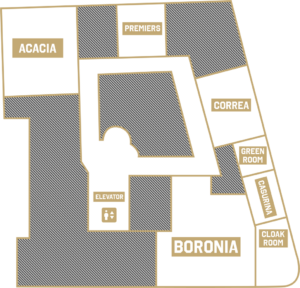
| 9:20 - 9:25 | Opening Remarks and Housekeeping |
|---|---|
| Acacia Room & Boronia Ballroom |
Dr Phil Lambert PSM – Director, Phil Lambert Consulting Pty Ltd

Dr Lambert has developed his expertise as a leader in schools, the NSW Department of Education, the Australian Curriculum, Assessment and Reporting Authority and as a university professor. He played a pivotal role in developing Australia’s first national curriculum and is a prolific writer and presenter, locally and internationally. Dr Lambert has received many honours and awards recognising his work, including the Public Service Medal for his outstanding contribution to education.
| 9:25 – 9:40 | CEO Address |
|---|---|
| Acacia Room & Boronia Ballroom |
Catholic Schools NSW Chief Executive Officer, Dallas McInerney, welcomes principals, teachers and leaders across the state to the first Secondary Curriculum Reform Conference 2023.
Dallas McInerney – Chief Executive Officer, Catholic Schools NSW

Dallas McInerney BA LLB MPP is the Chief Executive Officer of Catholic Schools NSW Ltd., the Approved System Authority for the State’s 595 Catholic schools. An experienced executive, Dallas is married with two children, his school education was in Southern Sydney and Central West NSW. A graduate of the Universities of Sydney (USYD) and New England (UNE), he resides in the Southern Highlands.
| 9:40 – 10:00 | Unlocking Meaningful Change: Effective Curriculum Reform Leadership |
|---|---|
| Acacia Room & Boronia Ballroom |
This keynote will explore the challenges and opportunities of curriculum reform and implementation. Effective curriculum implementation requires adaptive local leadership. Together we must move from a mind frame of ‘we have to’ towards one of ‘we get to’:
- How can we help overloaded educators to see and embrace the opportunity for curriculum reform?
- How can we capture a compelling case for change that will resonate with our staff?
- What throughlines can we draw to the longer-term improvement trajectory we have already pursued within our school?
Dr Simon Breakspear – Director, Breakspear Learning

Dr Simon Breakspear is a researcher, advisor and speaker on education policy, practice and change. Simon develops frameworks, tools and programs that make evidence-based ideas easy to understand and apply. Simon is an Adjunct Senior Lecturer at the University of New South Wales and an advisor to the NSW Department of Education School Leadership Institute. He earned his PhD in Education from the University of Cambridge, where he was a Gates Scholar.
| 10:00 – 10:30 | Keynote Address: Curriculum Directions |
|---|---|
| Acacia Room & Boronia Ballroom |
NESA CEO, Paul Martin will discuss the roadmap for the NSW Curriculum Reform.
Paul Martin – Chief Executive Officer, NSW Education Standards Authority

Paul Martin is the CEO of NESA and was appointed in December 2019 and has acted in the role since February 2019. Before being appointed as CEO, Paul was the Executive Director, Quality Teaching at NESA and before that, the Manager of Professional Learning and Initial Teacher Education at the former NSW Institute of Teachers (NSWIT).
| 11:00 - 11:50 | Breakout 1.1 NESA: Underpinnings of Curriculum Reform |
|---|---|
| Correa Room |
A key principle of the Curriculum Reform is equity and achievement for all students, such that the curriculum taught makes clear what teachers need to teach and what students need to learn. With a focus on a knowledge and skills-explicit curriculum. The Curriculum Reform aims to assure that students in Bourke have the same learning opportunities as students in Bourke Street and are prepared for their future lives.
Dr Paul Cahill – Executive Director, Curriculum Reform, NSW Education Standards Authority

Paul Cahill is the Executive Director of the Curriculum Reform division at the New South Wales Education Standards Authority (NESA). Paul has worked at NESA for five years and over the past eighteen months has been leading Curriculum Reform, the biggest overhaul of the education system in more than 30 years. Before his time at NESA Paul was Head of Secondary Curriculum at Sydney Catholic Schools.
Justine Ferrari – Director, Curriculum & Assessment Policy Curriculum Reform, NSW Education Standards Authority
Justine Ferrari is Director of Curriculum & Assessment Policy at the NSW Education Standards Authority.
| 11:00 – 11:50 | Breakout 1.2 NESA: Approaches to Senior Years Policies and Syllabuses |
|---|---|
| Premiers Room |
This session will provide participants with an overview of the senior secondary curriculum reform. Participants will learn about 11-12 syllabus development, connections between subjects and post-schooling pathways and the Assessment Certification Examination (ACE) manual.
Clare Cotton – Director, Curriculum Development 11-12, NSW Education Standards Authority
Clare Cotton is the Director of Curriculum Development 11-12, at NSW Education Standards Authority (NESA). She joins NESA from a dual role with the NSW Department of Education’s HSC strategy team within the Teaching Quality and Impact Directorate and as a member of school leadership at a public high school in Sydney. Clare was appointed to the Premiers ‘Best in Class’ teaching program at its inception in 2019 and is a recipient of a NSW government award for exemplary teaching practice.
| 11:00 – 11:50 | Breakout 1.3 NESA: 7-10 Syllabuses Under Consultation |
|---|---|
| Boronia Ballroom |
This session will provide participants with an overview of the 7-10 syllabuses that are being consulted on in the public Have your say period from 31 July until 11 September 2023. The syllabuses include Geography 7-10, History 7-10, PDHPE 7-10 and Visual Arts 7-10.
Melissa Gould-Drakeley – Director Curriculum Development 7-10, NSW Education Standards Authority

Melissa has a master’s in education from Deakin University and has been working with the NSW Education Standards Authority since 2019. Before her roles in government, she spent 20 years at the Macarthur Anglican School.
| 11:00 – 11:50 | Breakout 1.4 NESA: 3-6 Syllabuses Under Consultation |
|---|---|
| Acacia Room |
This session will provide participants with an overview of the K-6 syllabuses that are being consulted on in the public Have your say period from 31 July until 11 September 2023. The syllabuses are: Creative Arts K-6-, HSIE K-6, PDHPE K-6 and Science and Technology K-6.
Ananda Horton – Manager, Curriculum Development K-6, NSW Education Standards Authority
Ananda Horton is the Manager of Curriculum Development K-6 at the NSW Education Standards Authority.
| 11:55 – 12:45 | Breakout 2.1 Geography 11-12 Syllabus: Exploration of the Stages |
|---|---|
| Correa Room |
The session will include the approach taken by GTANSW & ACT in providing professional learning for the new Stage 6 Geography Syllabus including advice on - the digital syllabus, syllabus familiarisation, planning across 11- 12, building conceptual understanding, unpacking the exam specifications and assessment requirements, implications for Scope and Sequence and providing opportunities for networking in regional locations.
Lorraine Chaffer – Vice President, Geography Teachers Association NSW & ACT

Lorraine is a current Vice President GTANSW & ACT and has been a GTA Councillor for 18 years. She is currently leading the publication of a Case Study book for Stage 6 by GTANSW & ACT, as well as for the new Stage 6 Geography syllabus.
| 11:55 – 12:45 | Breakout 2.2 Mathematics 7-10 Syllabus: What are the Big Changes? |
|---|---|
| Acacia Room |
The new Mathematics syllabus for 7-10 will be rolled out over the next two years with implementation beginning in 2024. The major changes in the mathematics syllabus revolve around the importance of Working Mathematically. In this session, I will discuss the importance of embedding working mathematical skills in the classroom and highlight how the new Course Performance Descriptors will impact the structure of classes and methods of assessment in Stage 5.
Miriam Lees – Secondary Education Consultant, Mathematical Association of NSW

Miriam is the Secondary Education Consultant with the Mathematical Association of NSW (MANSW). She has extensive mathematics teaching experience, working as a head teacher for over eight years and teaching all levels of secondary mathematics from Year 7 through to Extension 2. Miriam's passion is supporting teachers and students to develop their mathematical identity, deepen their conceptual understanding and build real connections across the syllabus and outside the classroom.
| 11:55 – 12:45 | Breakout 2.3 English 7-10 Syllabus: Exploration of the Stages |
|---|---|
| Boronia Ballroom |
English holds a special place as being both about language and literature and is therefore an important discipline in any school. This presentation will build on the information ETA has shared online about how to read the 7-10 English syllabus; it will focus closely on how schools can program effectively to integrate the different parts of the syllabus into meaningful lessons that acknowledge the diversity of contexts in which we teach.
Mel Dixon – Education and Publication Officer, English Teachers Association NSW

Mel Dixon has taught English for over 25 years with ten years as Head of English and Dean of Humanities. As the Education and Publications Officer for the English Teachers Association NSW, she edits the state journal mETAphor and presents on English pedagogy. She holds a Master of Education with Literacy and Linguistics. She has been on various syllabus committees including National NAPLAN consultation and the TAG (advisory group) for the K-10 syllabus.
Jacob Anstey – Curriculum Officer, English Teachers Association NSW
Jacob Anstey has been an English teacher for over a decade. He is passionate about pre-service teacher education, and he works at the University of Wollongong as methods tutor and lecturer. He is currently employed by the English Teachers Association of New South Wales as a Curriculum Officer.
| 11:55 – 12:45 | Breakout 2.4 Aboriginal Languages – Catholic Schools NSW Research Report |
|---|---|
| Casuarina Room |
The team will speak about implementing the new K-10 Aboriginal languages syllabus. There has been a great resurgence in the use of NSW Aboriginal languages in recent decades. The generic nature of the syllabus and the newness of the teaching area means that substantial preparatory work is needed. There is also need for substantial professional development in the areas of community cooperation, Aboriginal languages and language revival. Much of this work is best done in close cooperation with other groups involved in Aboriginal language teaching, revival and Aboriginal languages.
Dr Br. Gianbattista (John) Giacon fsc, ANU

John Giacon is a Christian Brother. He taught Gamilaraay at the University of Sydney from 2006 to 2019, and at ANU from 2011 to 2023. In 2018 he received the Patji-Dawes award for outstanding language teaching in recognition of his work teaching Gamilaraay. He is a visiting lecturer at ANU and continues to work on language with communities, in particular Winanga-Li Aboriginal Child and Family Centre Gunnedah.
Dr Denise Angelo – Researcher, ANU

Denise Angelo is a Lecturer in the Master of Indigenous Languages Education at the University of Sydney and a Research Associate based at the Australian National University. She undertakes research with Aboriginal and Torres Strait Islander people on languages, traditional and new, and into language teaching and learning of Indigenous languages and of English as an Additional Language. She has experience supporting diverse Aboriginal language programs, in schools and for community-run organisations.
| 11:55 – 12:45 | Breakout 2.5 International Perspectives on Curriculum |
|---|---|
| Premiers Room |
Dr Lambert will provide participants with insight into 7 key disruptions to education impacting on schooling systems, schools and teachers across the globe. As part of this session a pre-recorded presentation from Andreas Schleicher, Director of Education and Skills at the OECD will be shown outlining his perspective on global directions within the context of NSW curriculum reforms. Dr Lambert will also draw on his experiences and insights working with various countries on reform initiatives with reference to the issues and challenged involved, the opportunities available and the tipping-points for change. He will also engage participants in exploring these from the perspective of the current curriculum reform in NSW, its implications, and how best to equip young people for a changed and changing world.
Dr Phil Lambert PSM – Director, Phil Lambert Consulting Pty Ltd

Dr Lambert has developed his expertise as a leader in schools, the NSW Department of Education, the Australian Curriculum, Assessment and Reporting Authority and as a university professor. He played a pivotal role in developing Australia’s first national curriculum and is a prolific writer and presenter, locally and internationally. Dr Lambert has received many honours and awards recognising his work, including the Public Service Medal for his outstanding contribution to education.
| 1:30 - 2:30 | Developing Collaborative Expertise: Empowering Educator Teams |
|---|---|
| Acacia Room & Boronia Ballroom |
Effective curriculum reform will require empowering middle leaders and teacher teams. In this session, we will:
- Design a path towards meaningful changes in professional collaboration, practice and knowledge within our local school contexts.
- Rethink how to harness existing professional collaboration structures, routines and processes in the service of curriculum implementation.
- Apply the research about effective professional learning to building teacher capacity and efficacy.
- Develop regular teacher team rhythms and norms.
- Underscore the importance of psychological safety.
Dr Simon Breakspear – Director, Breakspear Learning

Dr Simon Breakspear is a researcher, advisor and speaker on education policy, practice and change. Simon develops frameworks, tools and programs that make evidence-based ideas easy to understand and apply. Simon is an Adjunct Senior Lecturer at the University of New South Wales and an advisor to the NSW Department of Education School Leadership Institute. He earned his PhD in Education from the University of Cambridge, where he was a Gates Scholar.
| 2:35 - 3:25 | Breakout 3.1 AI Assessment – Secret Cyborgs in Schools |
|---|---|
| Boronia Ballroom |
This workshop will explore the ways in which assessment might be challenged and changed with the prevalence of AI in our classrooms and beyond. With a focus on secondary education, including the HSC, we will raise key questions and issues relating to why and how we conduct learning assessments in the post-AI world. Several AI tools will be highlighted to show the possibilities available to teachers and students.
Matthew Esterman – History Teacher and Director of Innovation and Partnerships, Our Lady of Mercy College, Parramatta

Matthew Esterman is a history teacher and the Director of Innovation and Partnerships at Our Lady of Mercy College, Parramatta. He holds master’s degrees from Macquarie University and the University of Sydney, and is the recipient of several awards from organisations such as the Australian College of Educators (ACE) and the Australian Council for Educational Leadership (ACEL). Matthew recently launched the Mercy Multicredential initiative at OLMC, which allows students to curate a portfolio of evidence from across their school experience towards a nationally recognised, formal credential.
| 2:35 - 3:25 | Breakout 3.2 Building Adaptive Expertise Amongst Teachers Through the Curriculum Reform Process: a TENs School Journey |
|---|---|
| Premiers Room |
How might schools leverage the planning and implementation of the NSW Curriculum Reform to optimise learning design that will enhance learner outcomes for all? This session provides an account of how one school is currently working through its engagement with the TENs program in strategically planning for the new curriculum across all KLAs. This experience has provided the scope for teachers to build an increasing knowledge of the new digital curriculum and for undertaking user testing. In this session participants will have opportunities to consider practical ideas and discuss with other participants how they are planning the implementation of this new curriculum for their context.
Cathy Molloy – Assistant Principal, Patrician Brothers’ College, Blacktown

Cathy Molloy is presently the Assistant Principal - Learning, Teaching & Innovation at Patrician Brothers’ College, Blacktown. She has held a number of school based and system based leadership roles that have been focused on leading learning and improving student outcomes for over 26 years.
| 2:35 - 3:25 | Breakout 3.3 Send Them Soaring: Curriculum Reform and High Potential & Gifted Learners |
|---|---|
| Acacia Room |
Let’s seize the Curriculum Reform as an opportunity to evaluate and reinvigorate our approaches to high potential & gifted education (HPG)! During this session we will explore best practice, including current and local case studies. The presentation will introduce a HPG Health Check reflective tool that can be used at different levels, to reflect on current practice and provide future direction. Attendees will leave the session with an understanding of how to enhance diocesan, school and/or classroom practices, to effectively support students.
Dr Denise Wood – Sub-Dean Academic Development, Charles Sturt University

Dr Denise Wood has worked in gifted education since 1990. Denise is a former president of the NSW Association for Gifted and Talented Children as well as the editor of the young people's section in the NSW Association’s journal. She has contributed to journals, policy development, book chapters, conference events, professional learning and parent communities across the last three decades.
Maree Karaka – Education Officer, Gifted Education, Maitland Newcastle Diocese

Maree is an experienced academic, researcher, parent and Indigenous educator. She is a specialist in High Potential and Gifted Education K-12, Early Years Education, Primary Education, and teacher-led, intentional, systematic instruction including Explicit Instruction within the International Baccalaureate Programmes and curriculum framework. She has a strong desire to position students and schools along a positive trajectory and see them achieve success academically, socially, emotionally and spiritually.
Penina Kiss – Learning Partner: High Potential & Gifted Education, Broken Bay Diocese

Penina Kiss previously led a dynamic research-based gifted education program in a range of school and system roles across Sydney. She has a passion for the identification of diverse gifted learners, teacher professional learning, educational psychology and program differentiation. Penina has presented at both national and international conferences, and is currently completing a gifted research project with Griffith University.
Catherine Curk – Education Officer, Gifted Education, Maitland Newcastle Diocese

Catherine comes from a primary background and has taught from K-6 across three different schools over the past 13 years. Last year, she completed her Masters in Gifted Education. She is passionate about the differentiation of curriculum in mainstream classrooms and the building of teacher capacity and understandings of High Potential and Gifted students.
| 2:35 - 3:25 | Breakout 3.4 NESA: Diverse Learning – Making the Reformed Syllabuses Accessible to All |
|---|---|
| Correa Room |
This session will unpack how the reformed syllabuses have been developed to provide access and equity for all learners, including students with disability, students for whom English is an additional language or dialect and gifted and talented students. Participants will learn about NESA’s Equity Principles and how these inform the design of the reformed syllabuses and enable inclusive teaching practices in the classroom.
Dr Sara Mills - Curriculum Reform Advisor, Diversity K-12, NSW Education Standards Authority
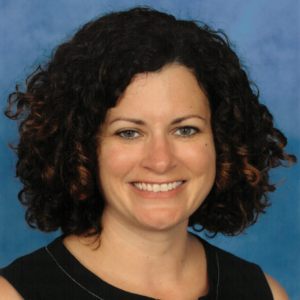
Dr Sara Mills is a Curriculum Reform Advisor, Diversity K-12 at NESA. Before joining NESA’s Curriculum Reform team, Dr Mills was a Master Special Education Teacher at MUSEC School where she led a class of primary-aged students with Autism, Intellectual Disabilities and other language-based disorders. She has over 20 years of experience in special education teaching, research and professional development. Dr Mills has worked with students with disabilities in both inclusive and self-contained settings, and in professional development with first-year teachers, instructional coaches and school administrators. Her research has focused on strategy instruction for writing and mathematical problem-solving.
| 2:35 - 3:25 | Breakout 3.5 Aboriginal Content and Implementing Recommendation 5.3 |
|---|---|
| Casuarina Room |
This session will provide participants with an overview of the process and implementation of Recommendation 5.3 ‘develop a curriculum that specifies what every student should know and understand about Aboriginal Cultures and Histories’ and its incorporation in HSIE.
Jenni Wenzel – Chief Education Officer, Aboriginal Education, NSW Education Standards Authority

Jenni is a Bundjalung, Gumbayngirr, Ngoorabul, Walbunja Yuin woman with kinship connections to the north and south coasts of NSW. Primarily working in Aboriginal Education at local, regional and state levels, she has worked tirelessly to ensure Aboriginal students, parents and communities are represented at all levels. Her teaching expertise ranges across Aboriginal Studies, Aboriginal Languages and HSIE with lecturing across several universities in Aboriginal Education.
Christina Howard – Aboriginal Education Advisor,NSW Education Standards Authority

Christina is a proud Gamilarray and Anaiwan woman with kinship connections to the people of Tingha and Uralla in north west NSW. She has worked across various educational organisations empowering young people by sharing authentic cultural knowledge. Christina's strengths are built on a foundation of forming meaningful connections with Aboriginal communities and creating opportunities for Aboriginal youth to be heard, respected and valued.
| 3:55 - 4:45 | Building Fresh Momentum: Launching your Implementation Team, Routines and Plan |
|---|---|
| Acacia Room & Boronia Ballroom |
In this practical session, we will draw together the key insights, concepts and tools that have emerged throughout the day and decide the next steps. Together we will:
- Identify how we can best prepare ourselves for the complex implementation journey.
- Prioritise the essential few objectives that need to be achieved.
- Consider what you must stop doing to create space for this work.
- Identify the key members of your implementation team and their roles and responsibilities.
- Develop an approach for tracking progress and celebrating milestones along the implementation journey.
- Build positive momentum by setting clear implementation intentions.
Dr Simon Breakspear – Director, Breakspear Learning

Dr Simon Breakspear is a researcher, advisor and speaker on education policy, practice and change. Simon develops frameworks, tools and programs that make evidence-based ideas easy to understand and apply. Simon is an Adjunct Senior Lecturer at the University of New South Wales and an advisor to the NSW Department of Education School Leadership Institute. He earned his PhD in Education from the University of Cambridge, where he was a Gates Scholar.
| 5:00 - 6:30 | Networking and Cocktail Event |
|---|---|
| Hermitage Room, Level One |
Join us at our Networking and Cocktail event in the Hermitage room on Level One. After a productive first day, take the opportunity to unwind, connect with colleagues, and engage in great conversations.
Musicians

Emilie Choi – Santa Sabina College

Anita Byun – Santa Sabina College
| 8:40 - 8:45 | Opening Remarks and Housekeeping |
|---|---|
| Acacia Room & Boronia Ballroom |
Dr Phil Lambert PSM – Director, Phil Lambert Consulting Pty Ltd

Dr Lambert has developed his expertise as a leader in schools, the NSW Department of Education, the Australian Curriculum, Assessment and Reporting Authority and as a university professor. He played a pivotal role in developing Australia’s first national curriculum and is a prolific writer and presenter, locally and internationally. Dr Lambert has received many honours and awards recognising his work, including the Public Service Medal for his outstanding contribution to education.
| 8:45 - 9:15 | Keynote Address: Curriculum – is not a dirty word… |
|---|---|
| Acacia Room & Boronia Ballroom |
We know that for our students to be successful in their post-school lives they must be creative and critical thinkers, have agility and be able to adapt, they must have strong digital skills and data literacy, as well as be effective communicators who can work both collaboratively and independently. As educators, we often feel the paradoxical, and at times ideological, conflict between trying to prepare students who are future ready whilst also trying to meet syllabus outcomes. Considering this, how can we as educators use new curriculum and syllabus reforms as an opportunity for growth for both ourselves as well as our students, so that instead of seeing challenges and insurmountable obstacles, we instead see opportunities for innovation and exciting learning experiences. What type of leader and teacher do we need to be in this context? How can we make the word ‘curriculum’ not a dirty word?
Dr Nicole Archard – Principal, Loreto College, Marryatville SA

Dr Nicole Archard (BA DipEd, MA, MEdLead, MTheolSt, PhD) has contributed widely to media on issues such as girls’ education, social issues concerning girls and women, STEM, innovation through curriculum, and classroom learning space design. In 2011, Nicole received the Excellence in Research Award for the Faculty of Human Sciences at Macquarie University, Sydney and in 2023, received the ACEL Educational Leadership Award (South Australia).
| 9:15 - 9:45 | Panel: Principals’ Perspectives |
|---|---|
| Acacia Room & Boronia Ballroom |
This panel will explore the role of leadership plays in curriculum reform.
Dr Nicole Archard – Principal, Loreto College, Marryatville SA

Dr Nicole Archard (BA DipEd, MA, MEdLead, MTheolSt, PhD) has contributed widely to media on issues such as girls’ education, social issues concerning girls and women, STEM, innovation through curriculum, and classroom learning space design. In 2011, Nicole received the Excellence in Research Award for the Faculty of Human Sciences at Macquarie University, Sydney and in 2023, received the ACEL Educational Leadership Award (South Australia).
Frank Chiment – Principal Leader, Patrician Brothers’ College, Blacktown

Frank Chiment regularly contributes to the local, national and international educational agenda. He has presented at national educational conferences and made submissions to parliamentary committee inquiries. Frank has significant experience in education and not for profit boards, where he still currently provides expertise.
Amanda Wilson BSc DipEd MEd Grad Dip Theol – Principal, St Joseph’s Catholic High School
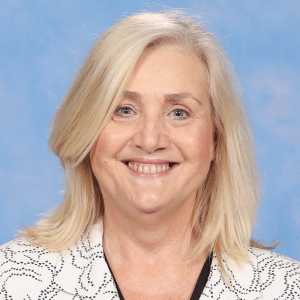
I am a passionate educator who believes in a holistic approach to education. Education for today's generation of students must cover the expansion of skills and critical thinking in order to take students to the next level of their learning. The students must be empowered to reach their full potential. I believe that as educators, our methods must inspire students to search beyond the classroom and explore aspects of their creativity. I have been a Principal for twelve years across two regional high schools and have over thirty-five years of experience in a selection of educational roles. I am an active member of ACSP, which gives a wider view of the impacts in education.
| 9:45 - 10:00 | Update on the Education Wallet |
|---|---|
| Acacia Room & Boronia Ballroom |
Listen to an update about the NSW Learner Passport and learn how your school can get involved.
Eric Land – Education Lead, NSW Department of Education

Eric holds a Master of Education specialising in the integration of technology. His area of interest remains at the intersection where effective teaching and learning are enabled by technology. He also loves to save teachers and school staff time.
| 10:30 - 11:10 | Panel: Curriculum Reform and Teacher Workload |
|---|---|
| Acacia Room & Boronia Ballroom |
Discussion panel on issues around teacher workload.
Mark Northam – Secretary Independent Education Union of Australia NSW/ACT Branch

Mark commenced his career as an English/History teacher, teaching for over 20 years at state and Catholic schools. Mark has also been a lecturer and practicum supervisor at Newcastle University. Mark has worked for the IEU since 2001 as an Organiser, Assistant Secretary, Deputy Secretary and Secretary.
Julie Sonnemann – Education Lead, Impact Economics

Julie Sonnemann has spent 8 years as the Deputy Program Director of Education at the Grattan Institute, an independent think tank in Melbourne. She has extensive experience in school education system reform and implementation, and has co-authored several high-profile reports on effective teaching, teacher workload, school funding and educational disadvantage.
Maura Manning – Director and CEO EREA NSW Colleges Ltd

Maura is an educational leader who has worked in a range of Independent schools and Catholic systems. She is the inaugural CEO of EREA NSW Colleges Ltd and was previously Director Learning at Catholic Schools Parramatta.
| 11:15 - 12:05 | Breakout 4.1 Individualisation Through Life Design |
|---|---|
| Acacia Room |
Students at St Luke's are provided time within our timetable structure to understand who they are and their impact on the world. Students work through their strengths, interests and motivations, describe their purpose and how they can have an impact on the world. They can engage in passion projects and learn all of those things that people say "Why don't they teach that at school". This gives an understanding of self and self-confidence with hope and planning for their future.
Kelly Bauer – Principal, St Luke’s Catholic College, Marsden Park (top)
Chloe Viney – Pedagogy Coach, St Luke’s Catholic College, Marsden Park (bottom)

Kelly Bauer and Chloe Viney have worked together at St Luke's Catholic College designing the Life Design program - where every student is given time and support to unpack their strengths, interests and motivations and how they can have an impact in the world. Since opening in 2017 with 86 students, St Luke’s has received multiple awards for innovation and learning design, including the Australian Educator award, and being named a Top Innovative School and 5-Star Innovative School by The Educator.

| 11:15 - 12:05 | Breakout Session 4.2 Curriculum Reform: Our Opportunity to Co-Create for a Hope Filled Future |
|---|---|
| Correa Room |
We are hurtling towards a future enriched by a multigenerational workforce, the endless possibilities of accelerated automation, and the infinite and untethered promise of our inherent humanness. Education is a grounding force in this rapid evolution, and our educators are the interconnectors between self, community and the broader world. How then, do we leverage the foundations of a learning experience of old to meet the less familiar needs of the new to co-create for a hope-filled future? This curriculum reform opens the door to opportunity. As ‘skilled helpful adults’ we can (and will) build the conditions for student agency to flourish. We just need to step through! In this interactive session, you will be challenged to consider the why of co-designing the curriculum in light of the reform and explore how to shift from lower to higher impact practices that help promote the conditions for co-creating a hope filled future.
Eli Simpson – SME: Strong Teams, Leadership Coaching, and Student Agency, Armidale Catholic Schools

Eli Simpson’s work includes building the capacity of leaders and leadership teams that result in effective organisational cohesion, innovation, and improved learner outcomes. Eli has held multiple roles including classroom teacher, Pastoral Academic Care Leader, Leader of Pedagogy, Head of House, and Assistant Principal (Learning).
| 11:15 - 12:05 | Breakout 4.3 St Aloysius’ College –Year 9 Rozelle Programme |
|---|---|
| Premiers Room |
The St Aloysius' College Rozelle program delivers on our commitment to “develop a deliberately designed learning experience for the ‘middle years’ of schooling”. In this session, Kate Quinane (Deputy Principal) and Elizabeth Phipps (Director of Teaching & Learning) will share the innovative Ignis Pathway at the 9 Rozelle Campus for Year 9 students to complete their mandated NESA curriculum requirements while learning to ‘connect the dots’ across learning disciplines, developing mastery in knowledge and understanding. Learn how the Ignis Pathway challenges students in their thinking and provide rigorous and purposeful learning opportunities with their expert teachers accompanying them along the way
Kate Quinane – Deputy Principal, St Aloysius’ College

Kate holds substantial operational and strategic responsibilities at St Aloysius’. She led the development of an innovative Year 9 Program aligned with the College's Strategic Plan, "Human Excellence," and is deeply committed to the Ignatian charism of a Jesuit school.
Elizabeth Phipps – Director of Teaching and Learning, St Aloysius’ College

Since her appointment as Director of Teaching & Learning earlier this year, Ms Phipps has taken on the responsibility of leading the high performing Heads of Department Team and academic program in the Senior School. This year, Elizabeth aims to renew the focus on the college’s strategic plans through the lens of Teacher Excellence and Student Excellence.
| 11:15 - 12:05 | Breakout 4.4 Improving Assessment Practices for Frontline Teachers |
|---|---|
| Boronia Ballroom |
Assessment practices are evolving. Faced with increased teacher workload, growing appetite for online experiences and the potential of artificial intelligence, technology promises to augment all points of the assessment lifecycle. This session will explore changes to assessment authoring, testing, grading and reporting including artificial intelligence tools, and share key consultation insights from students, teachers, parents and system administrators. Attendees will learn about the CSSA online assessment pilot currently underway and gain an understanding of how they can get involved.
Alex Dore – Founder of Gradeo

Alex Dore, Founder of Gradeo, an education technology start-up specialising in online assessment. Gradeo’s mission is to transform the way teachers assess and students sit assessments through technology. He is a director at a large global management consulting firm, where he has led multiple flagship programs, including the successful rollout of the national Higher Apprenticeship Pilot and development of the National Microcredentials Framework.
Monica O’Brien – Head of CSSA Exams, Catholic Schools NSW

Monica O’Brien (BA, DipEd, MEd, MEdLead, BPsychSc) is the Head of CSSA Exams and a member of the Education Directorate at Catholic School NSW. She has worked with the Department of Education and in two RI/PMJP schools. Monica has served in numerous leadership roles in both RI/PMJP schools and always with a focus on transformational change. She is also a published author of educational books for the NSW HSIE curriculum
| 12:50 - 1:30 | Keynote Address: Curriculum Reform as a Catalyst for Professional Renewal: Reclaiming Professional Learning |
|---|---|
| Acacia Room & Boronia Ballroom |
Despite the tensions and challenges curriculum reform can present amidst the demanding life-worlds of teachers and school communities, it can also be a powerful catalyst for professional development and renewal. This keynote explores how we might use this once in a generation moment of curriculum reform as an opportunity to rethink what good teacher professional learning is and how it can work as an enabler. It will consider how schools and school systems can create the conditions for high quality, sustained teacher professional learning that will deliver on the promise of the NSW curriculum reform and also strengthen and support the teaching profession.
Professor Dr Nicole Mockler – Professor of Education, Sydney School of Education and Social
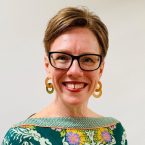
Dr Nicole Mockler, BEd(Hons), MA, MSc, PhD, is Professor of Education at the University of Sydney. Her background is in secondary school History and English teaching. Nicole's research focuses on teachers’ work and professional learning; education policy and politics; and curriculum and pedagogy, and she has authored over 75 peer-reviewed publications in these areas. In 2022 she was awarded the Dr Paul Brock Memorial Medal by the Australian Council for Educational Leadership (NSW).
| 1:30 - 2:00 | Keynote Address: The TENs Journey |
|---|---|
| Acacia Room & Boronia Ballroom |
Lisa Ryan, teacher, and Alexandra Harper, policymaker, will share their journey with the Teacher Expert Network (TENs) program. The experience of St Francis de Sales Regional College, Leeton will be shared as an example of Curriculum Reform in action.
Lisa Ryan – Leader of Curriculum, St Francis de Sales Regional College, Leeton

Lisa has worked in education for over 25 years occupying a variety of senior leadership roles in the fields of both Curriculum and Pastoral Care. Lisa is a current member of the NESA’s Teacher Expert Networks (TENs) in the Riverina region. She is passionate about the power of professional learning networks and establishing support mechanisms for teachers to ensure we achieve deep implementation of the NSW Curriculum Reform.
Alexandra Harper – Manager, Teacher Expert Network (TENs), NSW Education Standards Authority

Alexandra helped develop the teacher accreditation procedures for NSW's early childhood teachers and was a primary school teacher and school leader before taking on her role with the Teacher Expert Network.
| 2:00 - 2:30 | Panel: The Researcher, The Policymaker, and The Teacher |
|---|---|
| Acacia Room & Boronia Ballroom |
The panel will explore the issues related to Professional Learning from theoretical, structural, and practical perspectives.
Professor Dr Nicole Mockler – Professor of Education, Sydney School of Education and Social

Dr Nicole Mockler, BEd(Hons), MA, MSc, PhD, is Professor of Education at the University of Sydney. Her background is in secondary school History and English teaching. Nicole's research focuses on teachers’ work and professional learning; education policy and politics; and curriculum and pedagogy, and she has authored over 75 peer-reviewed publications in these areas. In 2022 she was awarded the Dr Paul Brock Memorial Medal by the Australian Council for Educational Leadership (NSW).
Lisa Ryan – Leader of Curriculum, St Francis de Sales Regional College, Leeton

Lisa has worked in education for over 25 years occupying a variety of senior leadership roles in the fields of both Curriculum and Pastoral Care. Lisa is a current member of the NESA’s Teacher Expert Networks (TENs) in the Riverina region. She is passionate about the power of professional learning networks and establishing support mechanisms for teachers to ensure we achieve deep implementation of the NSW Curriculum Reform.
Alexandra Harper – Manager, Teacher Expert Network (TENs), NSW Education Standards Authority

Alexandra helped develop the teacher accreditation procedures for NSW's early childhood teachers and was a primary school teacher and school leader before taking on her role with the Teacher Expert Network.
| 2:35 - 3:20 | Structured Plenary - Where To From Here |
|---|---|
| Acacia Room & Boronia Ballroom |
In this session Phil Lambert will draw together the key messages and impressions made over the two days of the Conference, highlighting the opportunities and challenges as well as proposing the journey ahead based on the main themes: Embracing Change and Optimising Learning and Engagement.
Dr Phil Lambert PSM – Director, Phil Lambert Consulting Pty Ltd

Dr Lambert has developed his expertise as a leader in schools, the NSW Department of Education, the Australian Curriculum, Assessment and Reporting Authority and as a university professor. He played a pivotal role in developing Australia’s first national curriculum and is a prolific writer and presenter, locally and internationally. Dr Lambert has received many honours and awards recognising his work, including the Public Service Medal for his outstanding contribution to education.
| 3:20 - 3:30 | Closing Remarks |
|---|---|
| Acacia Room & Boronia Ballroom |
Danielle Cronin – Director of Education Policy, Catholic Schools NSW

Danielle Cronin is the Director of Education Policy at Catholic Schools NSW with extensive experience in senior leadership roles. She represents the sector on significant national and state policy groups. Danielle holds degrees in Economics and Politics and Public Policy. Currently leading the CSNSW Strategic Workforce Review.




Exhibitors
The Learning Bar.
The Learning Bar works with the majority of Catholic Schools in NSW along with other major systems and is dedicated to reducing vulnerability and improving equality and equity in education to give all children the opportunity to thrive.
Our surveys, evaluations, interventions, literacy programs, and professional learning are part of a unique assessment framework that focuses on factors that impact all parts of a child’s well-being and learning outcomes. This evaluation framework is called Educational Prosperity.
The Early Years Evaluation® (EYE), Phonics Advantage Reading Assessment (PARA™), Confident Learners™ and the Tell Them From Me® (TTFM) survey are all part of the evaluation framework that can be used to assess children’s development at different stages of the life-course, from conception to adolescence. Our Science of Professional Learning series helps to develop capabilities for teachers and support staff. I have also attached a copy of the handout we plan to distribute for your reference.
NSW HALT Association Bar.
The HALT Association NSW is a professional forum for HALTs and aspiring HALTs to share, collaborate, explore research and to provide targeted, high-quality professional learning to build leadership, quality teaching that will impact on student learning. The Association is cross-sectorial and proudly supports HALTs and aspirant HALTs from across all school contexts in NSW in collaboration with NESA and the Professional Teachers Council.
IEU NSW/ACT Branch
The IEU represents the professional interests and concerns of all members at a state and national level, whether they work in a school, early childhood service, college, business college or other non-government educational institution. We advocate for improved pay and conditions, and a strong professional voice. The IEU collaborates with peak bodies in education.
Latest news
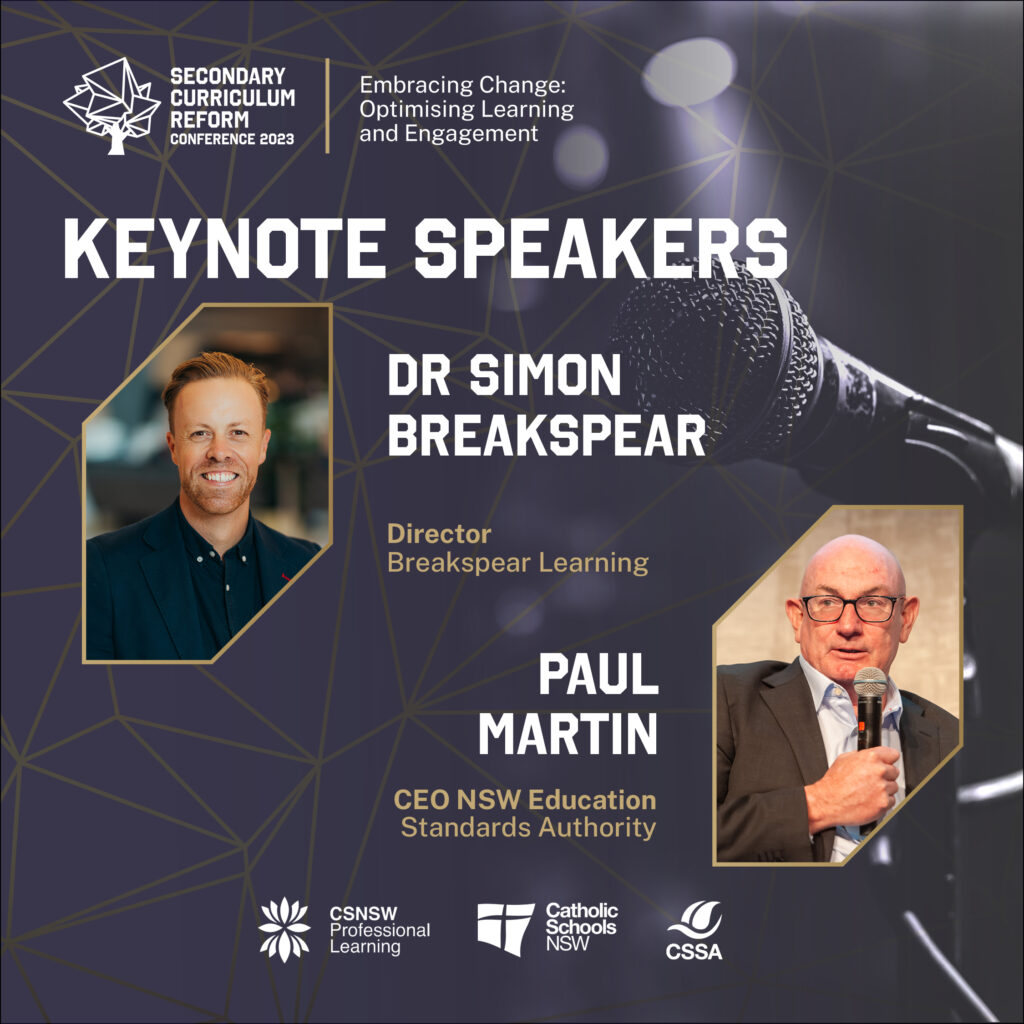
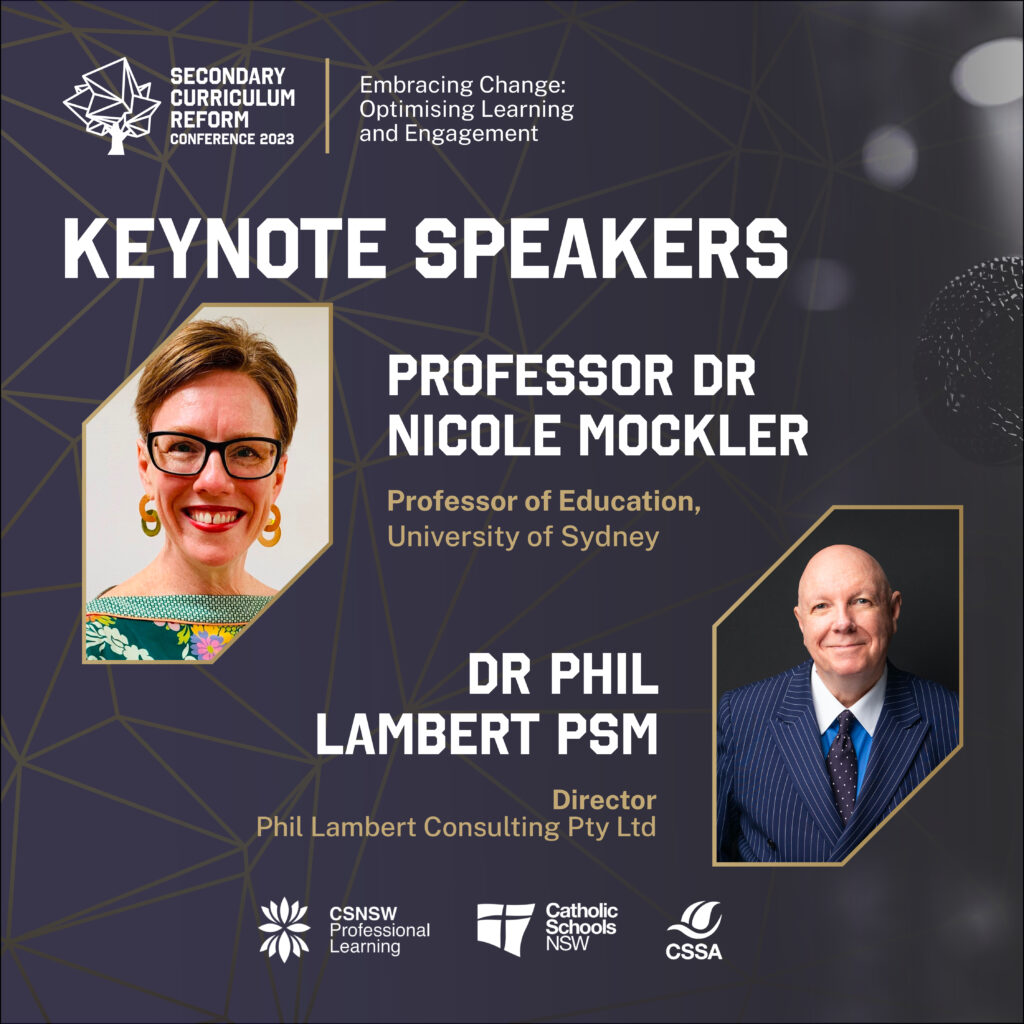

Any questions?
We’re happy to help with any questions you might have. Please get in touch using the button below.
